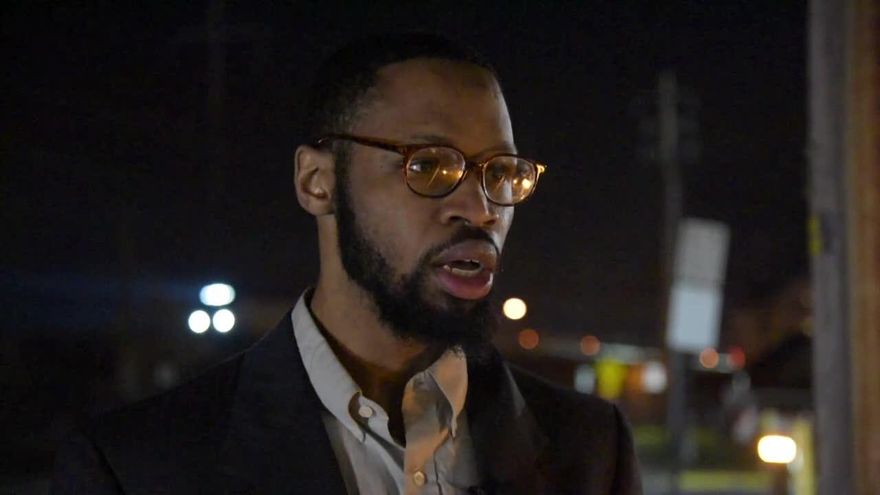
Isaiah McCoy, a death row prisoner for years, walked out of the Howard R. Young Correctional Institution in Wilmington and into his young daughters’ embraces on Thursday night just hours after a judge found him not guilty of murder in his second trial.
Outside the prison’s barbed wire fence and heavy doors, McCoy, 29, became emotional as he reunited with his girls and with the team of attorneys and an investigator who helped get him acquitted of the 2010 killing of 30-year-old James Munford.
“I just want to say to all those out there going through the same thing I’m going through ‘keep faith, keep fighting,” McCoy said. “Two years ago, I was on death row. At 25, I was given a death sentence – and I am today alive and well and kicking and a free man.”
A spokesman for the Department of Justice said prosecutors were disappointed by the verdict from Kent County Superior Court Judge Robert B. Young.
“While we are disappointed with the outcome of this case, we respect the decision of this court. This was a difficult case and the court indicated the basis for its decision at the time of the verdict,” spokesman Carl Kanefsky said.
The path to McCoy’s acquittal has been long.
STORY: No mistrial in McCoy murder retrial
STORY: Accomplice lays blame in Dover murder retrial
He was accused of shooting Munford to death during a drug deal in the rear parking lot of the Rodney Village Bowling Alley on May 4, 2010. The deal was supposed to be for 200 ecstasy pills and crack cocaine, but during the transaction, McCoy pulled out a gun and shot Munford, according to prosecutors.
A jury found McCoy guilty in June 2012, but the Delaware Supreme Court later overturned his conviction and death sentence.
The court did so because former Deputy Attorney General R. David Favata belittled McCoy and lied to a judge during the death penalty trial, the court said.
Favata made demeaning comments about McCoy’s choice to represent himself, such as “I have been to law school, your honor. I understand the rules” and “The trouble with dealing with somebody with a limited education and no legal education is he doesn’t clearly understand what he’s reading,” according to court documents.
Favata also, while in the presence of McCoy during a court recess, spoke about “Omerta,” an Italian mafia code of silence. Favata said he would put a detective back on the stand to tell everyone that McCoy was a snitch and added that McCoy could have trouble back in prison after the other inmates learn he is a snitch, the documents said.
The judge attempted multiple times to rein in Favata’s behavior, but it was not until July 2015 that Favata was suspended from the bar for six months and one day for what the court called “unprofessional conduct.” Favata had already retired from the state in March of that year.
With McCoy facing a retrial because of the conduct, Deputy Attorneys General Greg Babowal and Steve Smith gave him the option to plead guilty to manslaughter and a weapons charge, which would have carried a sentence of five to 50 years in prison. He refused the deal and proclaimed his innocence.
“He trusted the judge to look at the evidence, and the judge looked at the evidence and saw the two accomplices were not credible,” McCoy’s attorney, Herbert Mondros, said.
Attorney Michael Wiseman, also representing McCoy, spent hours questioning White on inconsistent stories he gave to law enforcement and a jury in McCoy’s first trial.
At one point in the week-long trial, it looked as though the judge would recuse himself from the case and order a mistrial after McCoy allegedly made a comment to a corrections officer that he would have sex with and rob the officer’s wife.
After contemplating the issue over night, the judge allowed the trial to continue and issued the verdict in the case around 2 p.m. Thursday. The judge noted the law on accomplice testimony and found the witnesses told conflicting stories that were uncorroborated by evidence.
Mondros said McCoy was extremely emotional as the verdict was read in court.
“Imagine a guy who had just spent the last six-and-a-half years on death row, in isolation, to now be essentially exonerated,” he said.
Mondros also was on a team that represented another death row inmate, Jermaine Wright, who was freed last year. Wright spent 20 years on death row before the Supreme Court overturned his 1991 conviction for the killing of 66-year-old Phillip Seifert, a liquor store clerk. He was allowed to plead not contest to second-degree murder on the eve of his retrial.
Mondros, Wiseman and investigator Phil Primason met McCoy outside the prison about seven hours after the verdict was read. They loaded boxes of legal documents into the car, as McCoy hugged and laughed with his daughters.
McCoy said he planned to spend the next days with his daughters and to let his new situation sink in.
“Give myself some time, and then I’ll be ready to tackle the world,” he said.
Contact Jessica Masulli Reyes at 302-324-2777, jmreyes@delawareonline.com or Twitter @JessicaMasulli.








